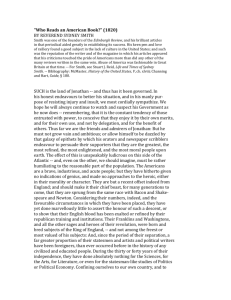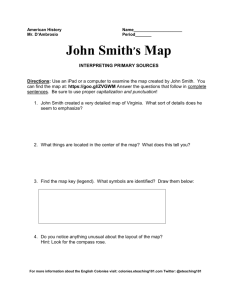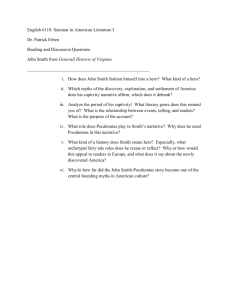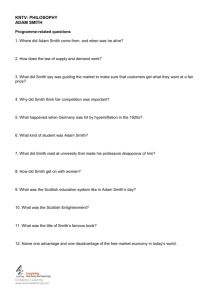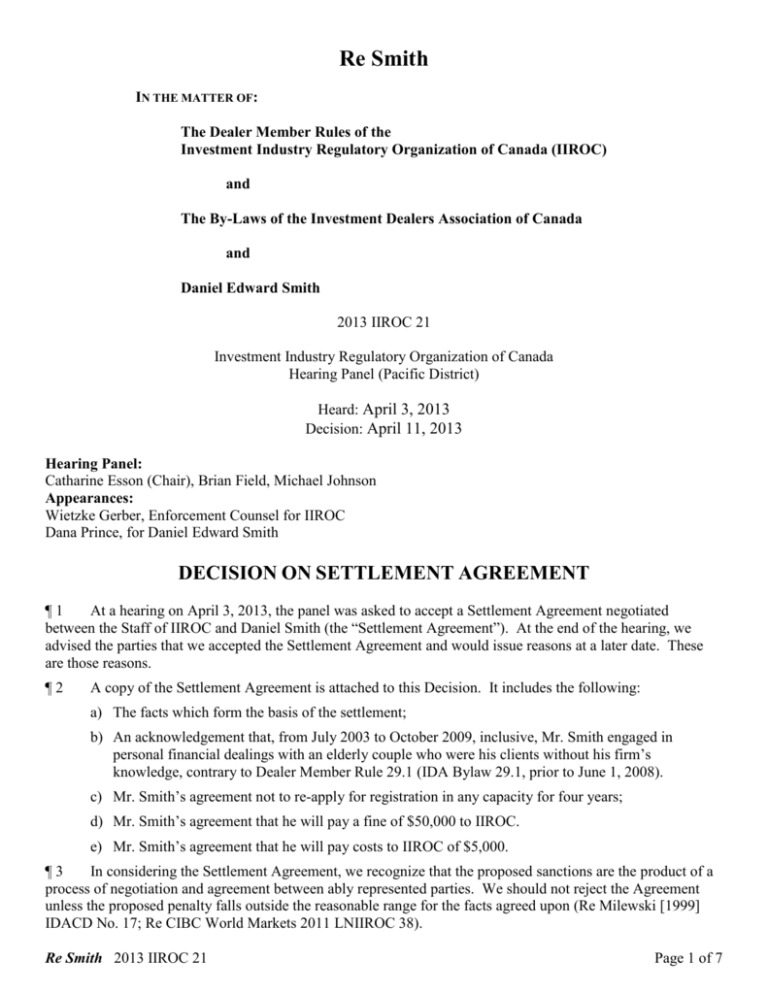
Re Smith
IN THE MATTER OF:
The Dealer Member Rules of the
Investment Industry Regulatory Organization of Canada (IIROC)
and
The By-Laws of the Investment Dealers Association of Canada
and
Daniel Edward Smith
2013 IIROC 21
Investment Industry Regulatory Organization of Canada
Hearing Panel (Pacific District)
Heard: April 3, 2013
Decision: April 11, 2013
Hearing Panel:
Catharine Esson (Chair), Brian Field, Michael Johnson
Appearances:
Wietzke Gerber, Enforcement Counsel for IIROC
Dana Prince, for Daniel Edward Smith
DECISION ON SETTLEMENT AGREEMENT
¶1
At a hearing on April 3, 2013, the panel was asked to accept a Settlement Agreement negotiated
between the Staff of IIROC and Daniel Smith (the “Settlement Agreement”). At the end of the hearing, we
advised the parties that we accepted the Settlement Agreement and would issue reasons at a later date. These
are those reasons.
¶2
A copy of the Settlement Agreement is attached to this Decision. It includes the following:
a) The facts which form the basis of the settlement;
b) An acknowledgement that, from July 2003 to October 2009, inclusive, Mr. Smith engaged in
personal financial dealings with an elderly couple who were his clients without his firm’s
knowledge, contrary to Dealer Member Rule 29.1 (IDA Bylaw 29.1, prior to June 1, 2008).
c) Mr. Smith’s agreement not to re-apply for registration in any capacity for four years;
d) Mr. Smith’s agreement that he will pay a fine of $50,000 to IIROC.
e) Mr. Smith’s agreement that he will pay costs to IIROC of $5,000.
¶3
In considering the Settlement Agreement, we recognize that the proposed sanctions are the product of a
process of negotiation and agreement between ably represented parties. We should not reject the Agreement
unless the proposed penalty falls outside the reasonable range for the facts agreed upon (Re Milewski [1999]
IDACD No. 17; Re CIBC World Markets 2011 LNIIROC 38).
Re Smith 2013 IIROC 21
Page 1 of 7
¶4
Investment advisors hold a uniquely privileged position of trust in the self-regulated securities industry.
As a result of their position, it is critically important to the reputation of the securities industry that investment
advisors either avoid situations which may give rise to conflicts between their interests and those of their clients
or ensure proper disclosure of these situations. The harm inherent in failing to do so was well described in Re:
Little [2007] IDACD No. 24:
42.
It is our view that transgressions must be looked at in the light of the reputation which the
investment industry must maintain in the eyes of the public and the effect which the
transgression could have upon that reputation. The public interest demands that Members of the
industry, and their employees, be held to a very high standard of financial probity. They must be
trusted because they handle other people’s money. They must be seen to be trustworthy. If
conduct could even appear to cast doubt upon that probity, then it could be detrimental to the
public interest and constitute conduct unbecoming.
43.
When the reputation for financial probity is involved, appearances are very important.
That is recognized in both the Compliance Manual and in the Guidelines of Conduct. For
example, in the Compliance Manual, the following appears as part of section 1.35:
… [E]mployees may not accept or offer … gifts or favour or become involved in any
situation or activity in which their personal interests may conflict or appear to conflict
with those of the Firm or its clients. [Emphasis added.]
44.
In the Guidelines of Conduct, under the heading Conflicts of Interest, the following is
stated:
You must be constantly be (sic) vigilant to identify conflicts of interest. Rules and
procedures have been developed to help you avoid situations which might give rise to an
appearance of a potential conflict of interest, whether or not such a conflict of interest
actually exists. [Emphasis added.]
45.
Taking a substantial gift from a client can do nothing other than raise a reasonable
question about the propriety of the transaction.
¶5
In addition to the recognition of the importance of dealing appropriately with potential conflicts in the
Compliance Manual and in the Guidelines of Conduct and previous decisions such as Little, supra; Mr. Smith’s
firm had policies in place that required all conflicts and perceived conflicts to be disclosed to its management.
Mr. Smith was required to acknowledge annually that he was aware of and complied with these policies.
¶6
Mr. Smith purchased property and accepted substantial benefits from his clients. In failing to disclose
these transactions to his firm, he exposed himself, his firm and the investment industry to reputational damage
and deprived his firm of the opportunity to investigate whether it was appropriate for him to engage in these
transactions and accept substantial benefits from his clients.
¶7
In considering the seriousness of the infraction in this case, we have been influenced by the following
factors:
a) There is no basis to conclude that Mr. Smith in fact took advantage of his clients, either in the
operation of their account or in securing benefits from them;
b) Mr. Smith’s clients were elderly and potentially vulnerable;
c) The financial dealings involved more than one transaction, substantial amounts of money and
substantial benefit to Mr. Smith and his family;
d) There were a number of occasions on which one would have expected Mr. Smith to have made
disclosure to his firm;
e) Mr. Smith has no disciplinary history.
f) By settling, Mr. Smith has acknowledged his misconduct and saved IIROC the cost of a hearing.
Re Smith 2013 IIROC 21
Page 2 of 7
¶8
We consider the Settlement Agreement to be reasonable in the circumstances. The proposed penalty
reflects that Mr. Smith’s conduct fell substantially below that expected of a registrant but also recognizes that
the admitted facts do not warrant Mr. Smith being permanently barred from rejoining the industry. We
therefore accept the Settlement Agreement.
Dated at Vancouver, BC, this 11th day of April, 2013.
Catharine Esson, Chair
Brian Field, Member
Michael Johnson, Member
SETTLEMENT AGREEMENT
I.
INTRODUCTION
1.
IIROC Enforcement Staff and Daniel Edward Smith (the Respondent), consent and agree to the
settlement of this matter by way of this settlement agreement (the Settlement Agreement).
2.
The Enforcement Department of IIROC has conducted an investigation (the Investigation) into the
conduct of Daniel Edward Smith.
3.
On June 1, 2008, IIROC consolidated the regulatory and enforcement functions of the Investment
Dealers Association of Canada and Market Regulation Services Inc. Pursuant to the Administrative
and Regulatory Services Agreement between IDA and IIROC, effective June 1, 2008, the IDA has
retained IIROC to provide services for IDA to carry out its regulatory functions.
4.
The Respondent consents to be subject to the jurisdiction of IIROC.
5.
The Investigation discloses matters for which the Respondent may be disciplined by a hearing panel
appointed pursuant to IIROC Transitional Rule No.1, Schedule C.1, Part C (the Hearing Panel).
II.
JOINT SETTLEMENT RECOMMENDATION
6.
Staff and the Respondent jointly recommend that the Hearing Panel accept this Settlement
Agreement.
7.
The Respondent admits to the following contraventions of IIROC Rules, Guidelines, IDA By-Laws,
Regulations or Policies:
a)
8.
From July 2003 to October 2009 inclusive, the Respondent engaged in personal financial
dealings with his client(s) without his firm’s knowledge, contrary to Dealer Member Rule
29.1 (IDA By-law 29.1, prior to June 1, 2008).
Staff and the Respondent agree to the following terms of settlement:
a)
The Respondent shall not be permitted to re-apply for registration in any capacity for four
(4) years.
b)
The Respondent shall pay a $50,000 fine.
9.
The Respondent agrees to pay costs to IIROC in the sum of $5,000.
III.
STATEMENT OF FACTS
(i)
10.
Acknowledgment
Staff and the Respondent agree with the facts set out in Section III and acknowledge that the terms
of the settlement contained in this Settlement Agreement are based upon those specific facts.
Re Smith 2013 IIROC 21
Page 3 of 7
(ii)
Factual Background
OVERVIEW
11.
At all material times, Smith was employed as an RR with BMO Nesbitt Burns Inc. (Nesbitt). Mr.
and Mrs. S (the Ss or Client) were Smith’s elderly clients. Smith and his family developed a close
friendship with the Ss.
12.
At a time when Mr. S was ill, the Ss’ agreed to sell their property to Smith and his wife. After Mr.
S’s death, Mrs. S gave each of Smith’s two children a monetary gift to assist with their university
education. Mrs. S also executed a new will in which Smith and his family were named as a 75%
beneficiary of her estate.
13.
Smith failed to disclose these transactions to Nesbitt, despite several opportunities to do so. This
failure to disclose prevented Nesbitt from conducting any oversight into any actual or perceived
conflicts of interest that these personal financial dealings may have created.
THE RESPONDENT
14.
Smith commenced his employment in the securities industry in 1993 with Midland Walwyn Capital
Inc. In 1995 he transferred to Nesbitt where he remained employed until Nesbitt terminated him for
cause on February 1, 2010 as a result of the matters described herein. He has not been employed in a
registered capacity in the securities industry since.
15.
Smith does not have a disciplinary history.
16.
Smith’s wife, (CS), was employed by Nesbitt as an unregistered office assistant.
NESBITT POLICIES
17.
At all material times, Nesbitt had policies in place that required all conflicts and perceived conflicts
of interest to be disclosed to Nesbitt management. According to its policies, these conflicts of
interest with prospective or actual clients could result from a direct or indirect personal interest in a
transaction or the acceptance of gifts or benefits of more than a nominal value.
18.
Smith annually completed an acknowledgement that he had read, understood and complied with
Nesbitt’s Code of Business Conduct and Ethics. He did not note any exceptions in his forms for the
years 2003 – 2009 inclusive.
MR. AND MRS. S
19.
Smith met Mr. and Mrs. S in late 1993 or early 1994 when they became his clients during his
employment at Midland Walwyn. When Smith transferred to Nesbitt, the Ss also moved their
accounts to Nesbitt. After becoming clients, Smith and his family developed a close personal
relationship with the Ss, who did not have children.
20.
Mr. S was born in 1920 and Mrs. S was born in 1918. They owned and lived together on a 1.5 lot
waterfront property in Nanoose Bay, BC (Property).
2000
21.
On or about August 22, 2000, Mrs. S appointed CS to be Power of Attorney over her affairs. Smith
did not disclose this fact to Nesbitt.
2003
22.
In early 2003, Mr. S was diagnosed with cancer. The Ss had a difficult time and Mr. S was very sick.
CS helped the Ss by taking them to medical appointments and other errands. She treated the Ss like
her own grandparents.
23.
On or about July 11, 2003, the Ss signed a contract of purchase and sale to sell the Property to Smith
and CS for $304,500, which was the 2003 taxed assessed value of the Property. Smith assumed that
Re Smith 2013 IIROC 21
Page 4 of 7
the purchase price was fair market value. He did not have the Property independently appraised nor
did he advise the Ss to have an independent appraisal done. The 2004 taxed assessed value of the
Property was $360,100.
24.
Smith did not advise Nesbitt that he had entered into this contract with the Ss.
25.
Mr. S passed away on December 15, 2003, at age 83.
2004
26.
Mrs. S was very upset by her husband’s death and she relied more on CS. CS checked in on Mrs. S
daily and took her on errands, appointments and outings.
27.
On January 15, 2004, the conveyance of the Property from the Ss to Smith and CS took place. Smith
did not advise Nesbitt of this fact.
28.
In early 2004, Mrs. S gifted each of Smith’s two children $30,000 to assist them with their
university education. The children were attending university away from home at the time.
29.
Smith was aware of these gifts but did not advise Nesbitt of same. The gifts were deposited into the
Smith’s children’s Nesbitt accounts and used over time to supplement their university expenses.
30.
Mrs. S wanted to make a new will. In her previous 1999 will, she left her entire estate to Mr. S and if
he predeceased her, she left 100% of her personal effects and estate to charity.
31.
At Mrs. S’s request, on January 30, 2004, Smith contacted a lawyer to make an appointment for Mrs.
S to change her will. Smith believed and was concerned that Mrs. S intended to include him and his
family as beneficiaries of her estate and he so advised the lawyer.
32.
On February 4, 2004, Smith drove Mrs. S to her appointment with the lawyer and on February 23,
2004 Mrs. S executed her new will in which Smith and his family were named 75% beneficiaries of
her estate. She appointed BMO Trust Company to be executor of her estate (BMO Trust). BMO
Trust is a separate legal entity from Nesbitt, each having its own compliance department. Smith had
no involvement in the execution of Mrs. S’s will.
33.
At no point did Smith disclose to Nesbitt the Client’s intention to name him and his family as
beneficiaries.
2006
34.
In or about June and July 2006, during a routine estate review, BMO Trust contacted Smith about
Mrs. S’s will. Smith advised BMO Trust that Mrs. S had updated her will and that BMO Trust was
still appointed Executor. BMO Trust did not have a copy of the updated will. Smith advised that CS
had access to the will (as she was Power of Attorney) and that they would provide BMO Trust with
a copy. The will was not provided so BMO Trust subsequently agreed to “memo-ing the file” on the
status of Mrs. S’s will.
2007
35.
In or about January 2007, Smith approached Nesbitt Compliance when the power of attorney that CS
had over Mrs. S’s affairs was going to be invoked due to Mrs. S’s deteriorating mental health.
36.
In late January 2007, Nesbitt Compliance granted approval for CS to act as power of attorney for
Mrs. S. At this time, management of Mrs. S’s accounts at Nesbitt was transferred to Smith’s partner,
although they remained under a joint sales code and Smith continued to earn commissions from
these accounts. At all times, the Ss’ accounts were appropriately invested and they were never
actively traded.
2008/2009
37.
Mrs. S passed away on October 9, 2008 at age 90.
Re Smith 2013 IIROC 21
Page 5 of 7
38.
Upon obtaining a copy of the updated will, BMO Trust staff advised Smith that he was a beneficiary
of Mrs. S’s estate. At that time, BMO Trust staff reminded Smith that accepting gifts from clients
was against policy and advised that they would refer the matter to their compliance department.
BMO Trust staff met with Smith and CS on October 16, 2008 at which time CS provided the
original will. Smith did not advise Nesbitt Compliance after it was confirmed that Smith and his
family had been named beneficiaries of Mrs. S’s estate.
39.
In late 2008, Nesbitt Compliance was notified by BMO Trust that Smith and CS had been named the
primary beneficiaries of Mrs. S’s estate.
40.
During late 2008 and early 2009, Nesbitt Compliance questioned Smith about Mrs. S’s estate and
the circumstances under which he and his wife were named beneficiaries under her will. At no time
during this period did Smith disclose the Property transfer or the monetary gifts to his children.
41.
On or about September 16 or 17, 2009, in response to a request from Nesbitt, Smith prepared an
outline of his relationship with the Ss. In that outline, Smith made no mention of the Property
transfer or the monetary gift from Mrs. S to his children.
42.
In October 2009, Nesbitt’s Managing Director of Retail Compliance met with Smith and CS and
asked them about the Property transfer and how they came to be named as beneficiaries under Mrs.
S’s will, and whether there were any other personal dealings with Mrs. S. In response, Smith
disclosed the monetary gift Mrs. S had given to his children and the details about the Property
transfer.
2010
43.
On February 1, 2010, Nesbitt terminated Smith’s employment for cause.
44.
The gross value of Mrs. S’s estate for probate purposes was $1,223,086.06. Distributions to Smith
and CS were made in accordance with her will, which was 75% of her estate (approximately
$917,000). An interim distribution was made to beneficiaries in September 2010 and the final
distribution was made on August 5, 2011.
2011
45.
Smith was interviewed by Staff in March 2011. During his interview, Smith denied having any
discussions with Mrs. S about the prospect of her leaving her estate or a portion of her estate to
Smith and his family.
IV.
TERMS OF SETTLEMENT
46.
This settlement is agreed upon in accordance with IIROC Dealer Member Rules 20.35 to 20.40,
inclusive and Rule 15 of the Dealer Member Rules of Practice and Procedure.
The Settlement Agreement is subject to acceptance by the Hearing Panel.
47.
The Settlement Agreement shall become effective and binding upon the Respondent and Staff as of
the date of its acceptance by the Hearing Panel.
48.
The Settlement Agreement will be presented to the Hearing Panel at a hearing (the Settlement
Hearing) for approval. Following the conclusion of the Settlement Hearing, the Hearing Panel may
either accept or reject the Settlement Agreement.
49.
If the Hearing Panel accepts the Settlement Agreement, the Respondent waives his/her/it’s right
under IIROC rules and any applicable legislation to a disciplinary hearing, review or appeal.
50.
If the Hearing Panel rejects the Settlement Agreement, Staff and the Respondent may enter into
another settlement agreement; or Staff may proceed to a disciplinary hearing in relation to the
matters disclosed in the Investigation.
51.
The Settlement Agreement will become available to the public upon its acceptance by the Hearing
Re Smith 2013 IIROC 21
Page 6 of 7
Panel.
52.
Staff and the Respondent agree that if the Hearing Panel accepts the Settlement Agreement, they, or
anyone on their behalf, will not make any public statements inconsistent with the Settlement
Agreement.
53.
Unless otherwise stated, any monetary penalties and costs imposed upon the Respondent are payable
immediately upon the effective date of the Settlement Agreement.
54.
Unless otherwise stated, any suspensions, bars, expulsions, restrictions or other terms of the
Settlement Agreement shall commence on the effective date of the Settlement Agreement.
AGREED TO by the Respondent at the City of
in the Province of
British Columbia, this ________ day of _____________________, 2013.
“Witness”
“Daniel Smith”
Witness
Respondent
AGREED TO by Staff at the City of Vancouver in the Province of British Columbia,
this 25 day of March, 2013.
“Witness”
“Wietzke Gerber”
Witness
Wietzke Gerber
Enforcement Counsel on behalf of Staff of the
Investment Industry Regulatory Organization of
Canada
ACCEPTED at the City of Vancouver in the Province of British Columbia,
this 25 day of March, 2013, by the following Hearing Panel:
Per:
“Catherine Esson”
Panel Chair
Per:
“Brian Field”
Panel Member
Per:
“Michael Johnson”
Panel Member
Copyright © 2013 Investment Industry Regulatory Organization of Canada. All Rights Reserved.
Re Smith 2013 IIROC 21
Page 7 of 7






